Who is more important in the Abkhaz Church?
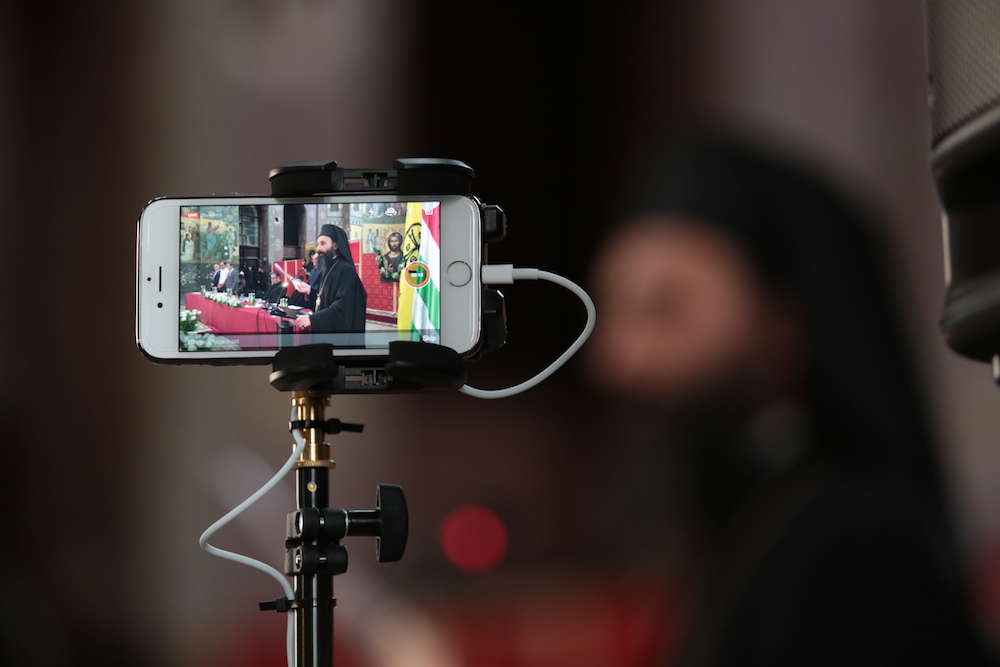
Who’s for whom?
A conflict in Abkhazian Church is not a projection of the whole public-political situation in Abkhazia, where everyone was divided into groups of insiders and outsiders long ago.
Who is to be supported – the freedom-loving and cussed Archdiocese headed by Archimandrite Dorotheus or Father Vissarion, supported by the Russian Orthodox Church (i.e. by the Kremlin)? Neither the authorities nor the opposition have a common position on this issue.
The Kremlin factor has certainly had its effect. There were fewer politicians at the forum than last time.
That Sunday morning in the New Athos Monastery, where the Second Church-People Assembly of the rebellious Abkhazian Holy Archdiocese was held, only seemed to be ordinary.
There was no fuss. The only exception were the two ranges of tables at the entrance to the monastery, where young girls with handkerchiefs were filling in delegates’ forms with the diligence of a pupil.
Several people gathered in the yard outside the monastery an hour-and-a-half before the event.
Temur Dzidzaria, a member of the Archdiocese Council, representing the laity, reassured:
– Everything’s fine, they are gathering in typical Abkhaz manner. The main mass will come right on schedule or will be a little bit late.
Background of the issue
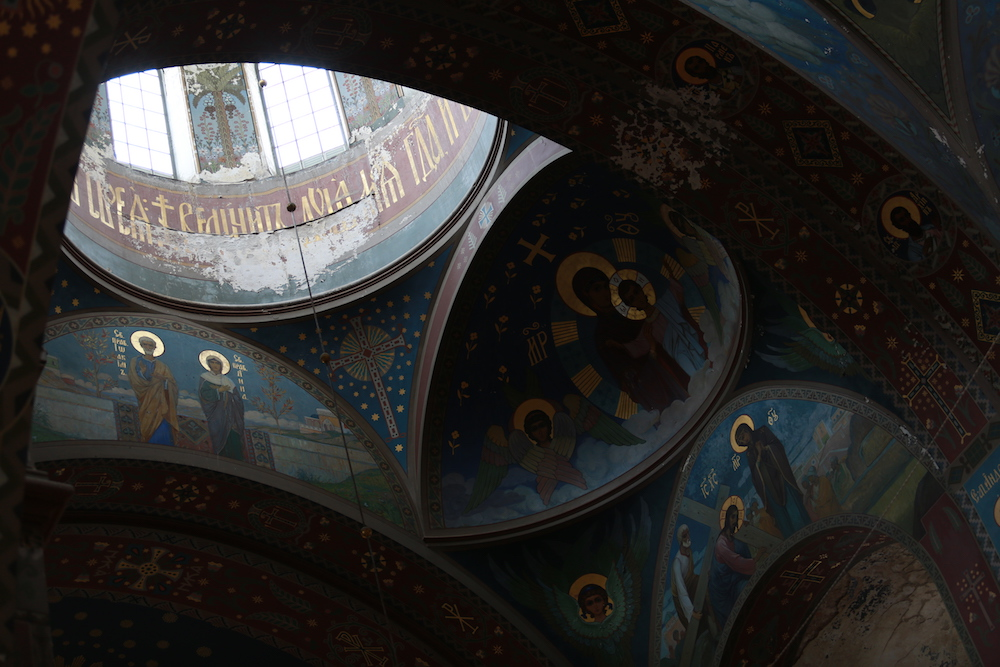
The Church has been officially separated from the state, though in such less developed states like Abkhazia, the Constitution resembles more a compilation of vain wishes rather than a regulatory document. The Church in Abkhazia (like in Russia and Georgia) has never abandoned the political life.
Five years ago, when the Holy Archdiocese held its first meeting, Raul Khajimba, then-leader of the opposition, supported Father Dorotheus and even delivered an impassioned speech.
However, being the President of Abkhazia, he cannot attend this meeting.
Moscow, represented by the Russian Orthodox Church, has put an eye on the New Athos Monastery. It has a strong dislike for Father Dorotheus. And even the neutral behavior of government officials with regard to this issue irritates it so much that the Kremlin politicians are more and more often connecting the financial assistance to Abkhazia with the resolution of church conflict.
This Moscow-like solution implies the ousting of Father Dorotheus and the rest of the rebelled friary. Even by force, if necessary.
A couple of months ago, Khajimba seemed to be ready for extreme measures. However, a group of MPs of the Parliament of the first convocation, headed by Stanislav Lakoba and Oleg Damenia, came to him. It is noteworthy that both of them are active supporters of the independence of the Abkhazian Church.
As a result, version which included use-of-force was annulled (or postponed). At the same time, the President expressed his attitude through a press-service: “Holding the civil meeting in the New Athos Monastery may have a negative impact on the prospects for overcoming a split within the church and contradicts the interests of the Abkhazian Orthodox Community.
The President’s two closest allies, in his closest circles, MPs Aslan Kobakhia and Akhra Bzhania, as well as the President’s Assistant, Damei Kvitsinia and the Head of the Migration Service, Aleksey Ajinjal, arrived in the New Athos to support the Holly Archdiocese .
The united opposition was represented even more modestly – Irina Agrba, the Head of the Women in Politics organization and Dmitry Dbar, the “Kyaraza leader.
Almas Japua, an “Aynar party activist and Raul Lolua, ex-Minister of Interior, represented those who did not join any camp.
New Athos residents have their own opinion
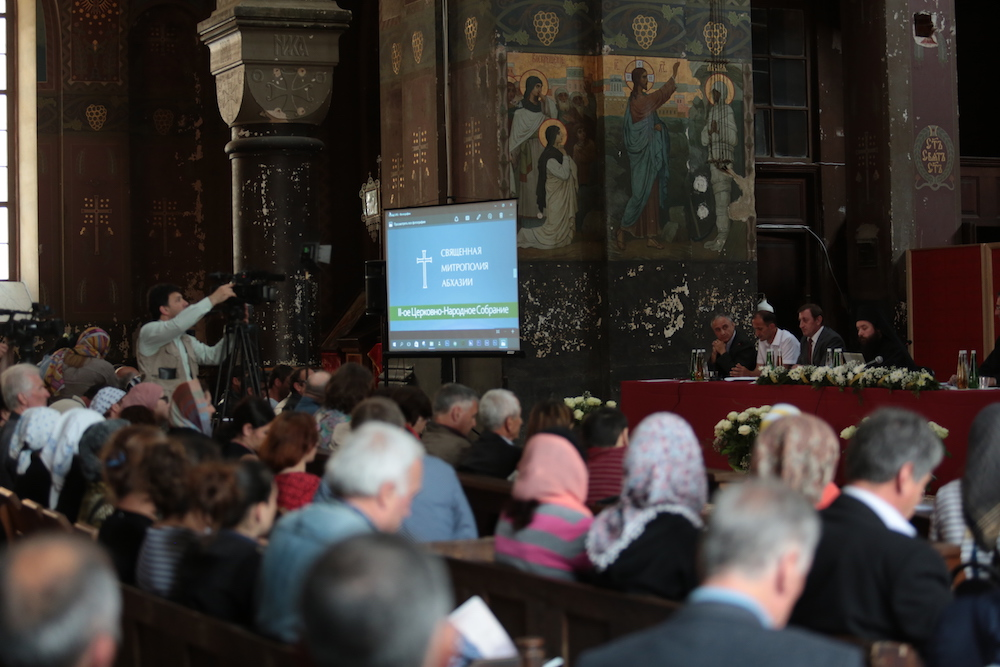
Almost all residents of New Athos, including the head of the local administration, came to the church meeting. They now seem to be the main bulwark of the Holy Archdiocese.
“We tried to settle the conflict several times. Father Vissarion demands full repentance and to be allowed to depart to Moscow, where a decision will be allegedly made. Naturally, it does not suit Dorotheus, as he does not regard himself as the Russian Orthodox Church cleric. The matter dos not concern his personal fate, but rather the Abkhazian autocephaly, says Miron Chalmaz, Deputy Director of the New Athos Cave.
They were the New Athos residents, who comprised the core of the laity, and were present at the church meeting, by noon.
What should be done
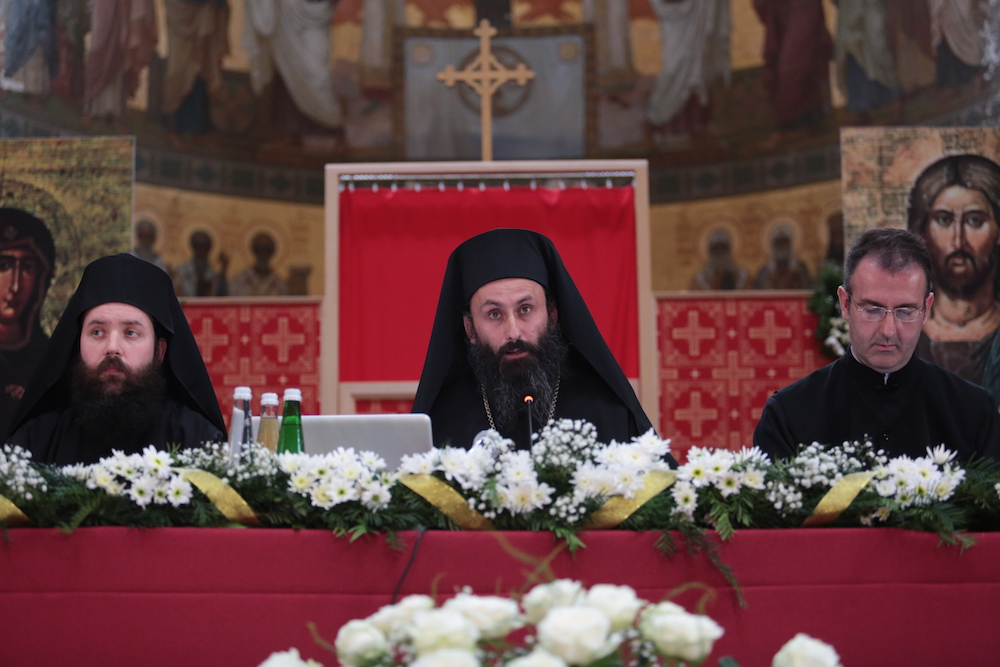
Father Dorotheus believes that the Abkhazian ecclesiastic problem must be solved by a “step-by-step restoration of the institution of the autocephalous Local Orthodox Church in the territory of the present-day Republic of Abkhazia.
“The delegation of the Georgian Orthodox Church is not entitled to represent the Abkhazian Orthodox congregation, he stated, calling on the participants to appeal to the Chairman of the Pan-Orthodox Council, due to be held in Crites, in June this year.
What shouldn’t be done
The Head of the Archdiocese also described the dangers on the path to a set goal.
• First of all, we should not try to create “our own national church as the Orthodox Teaching does not know any national and completely independent churches. There is only the uniform Conciliar (Catholic) and Apostolic Church.
• Secondly, one should realize that under the ecclesiastical canons, a new full-fledged ecclesiastic institution could be set up in Abkhazia only with participation of the entire Orthodox Community, headed by the Ecumenical Patriarch.
• Thirdly, we should prepare for a long-lasting struggle. “In May 1917, the Georgian clergy took a far more complex path than the Abkhazian one. They were anathematized from the Church; the Church, itself, was believed to be factious until 1943. However, at present, the Georgian Orthodox Church is a full-fledged member of the Orthodox Community and will attend the Pan-Orthodox Council. Whereas the Abkhazian clergy, who relied on All-Russian Church Synod’s pledges, chose another path that finally led it to a forceful inclusion of the Abkhazian congregation into the Georgian Orthodox Church.
Several years ago, the Holy Archdiocese and the Ecumenical Patriarch, Bartholomew, started discussions on the Abkhazian issue. The Patriarch described the conditions, under which there would could progress made. Herman Marshania, Secretary of the Holy Archdiocese, states:
• First of all, it is necessary to listen to the people’s opinion about their willingness or unwillingness to remain a part of the Georgian Orthodox Church.
• Secondly, we must hear the opinion of the clergy in the territory of Abkhazia with regard to this issue.
• And thirdly, an official application of the head of state is required for beginning the restoration of the church institution and for the legitimization of this activity on the part of the Ecumenical Patriarchate.
Over 70,000 signatures for the restoration of autocephaly of the Abkhazian Orthodox Church have been already collected. In May 2014, all clergy, irrespective of the organization they belonged to, signed an appeal to the Council of the Local Churches, requesting the aforesaid. The third condition – an official appeal of the President of Abkhazia- has not been fulfilled yet.
There is an obvious imbalance between the conflicting sides. Father Vissarion has been actively supported by Kremlin, Patriarch Kirill, a good dozen of prominent Abkhazian politicians, as well as President Khajimba.
Whereas Father Dorotheus, his opponent, is supported only by the New Athos residents and several politicians, who have prominent names, but have no resources.
However, the outcome of this confrontation is not that obvious.
Abkhazia’s reality is such that none of the serious domestic Abkhaz conflicts could be a priori settled amidst the lacks of public consensus. Of course, the monks can be ousted from the monastery, especially as there are just few of them left, and a bold line could be drawn, as it may seem to someone from the sidelines.
However, even the President understands that the problem cannot be solved by force. A deal should be made.
JAMnews dossier
- In 2008, the Russian Federation recognized the independence of Abkhazia, but the Russian Orthodox Church continued to regard it as a canonic territory of the Georgian Orthodox Church, which it needed as an ally in a struggle against the Ukrainian and other church separatists.
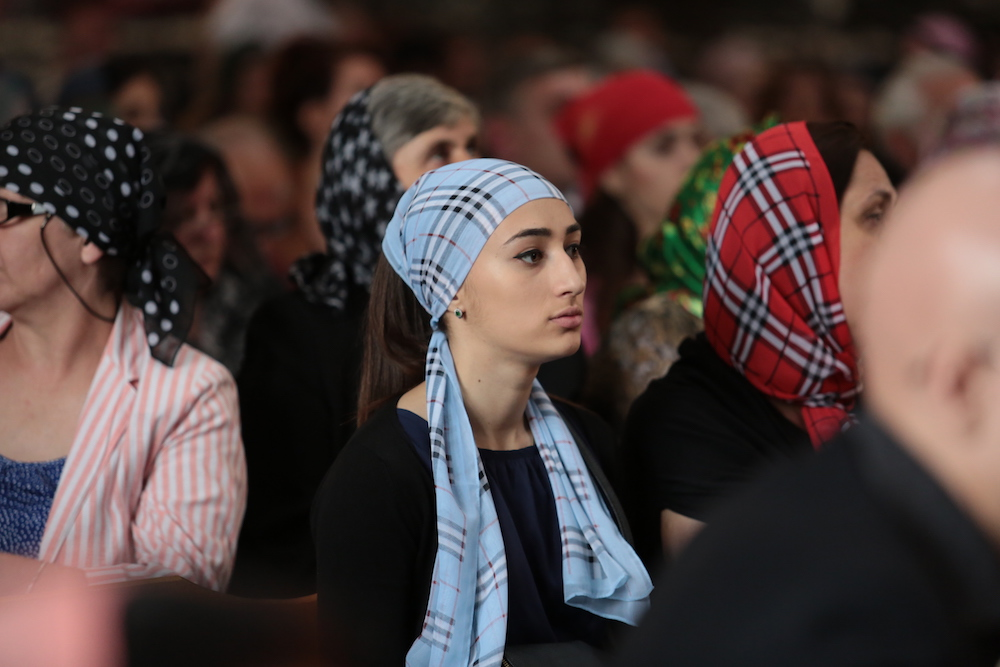
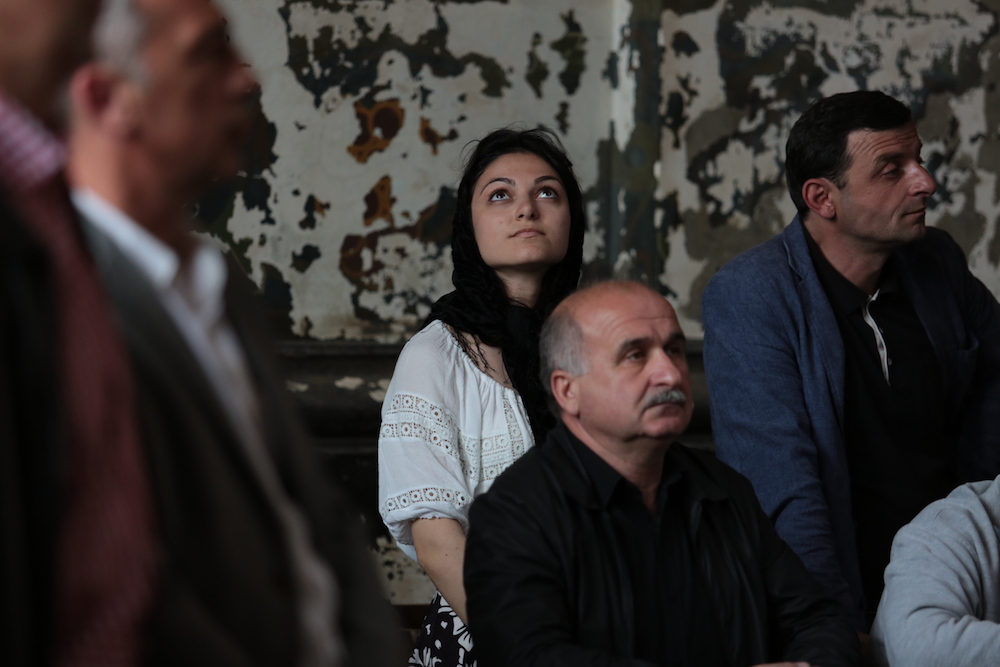
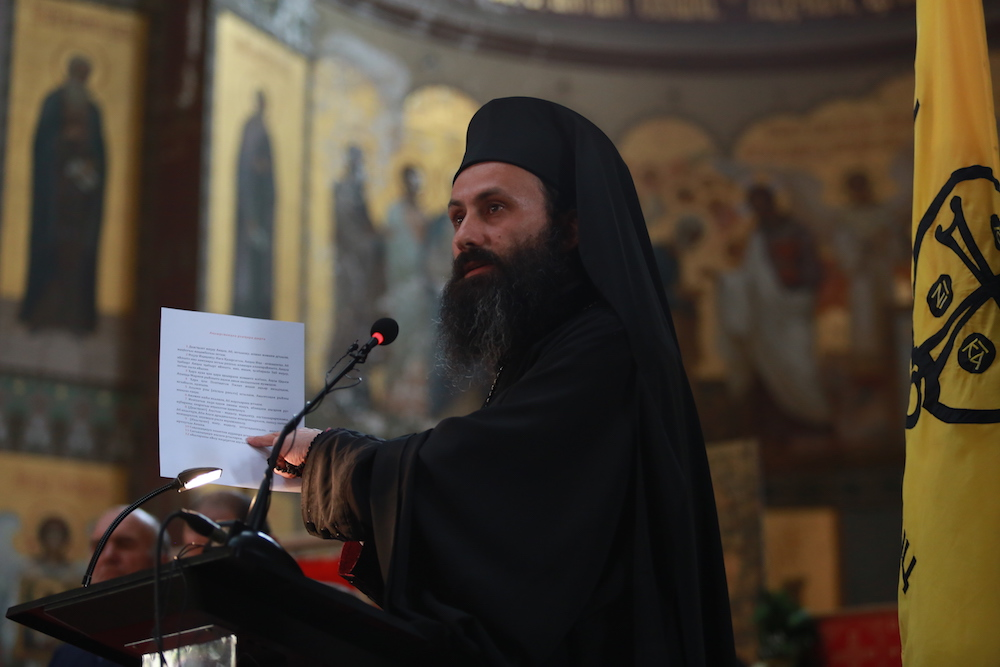
Toponyms, terminology, views and opinions expressed in the article do not necessarily reflect the views and opinions of JAMnews or any employees thereof. JAMnews reserves the right to delete comments it considers to be offensive, inflammatory, threatening, or otherwise unacceptable


















